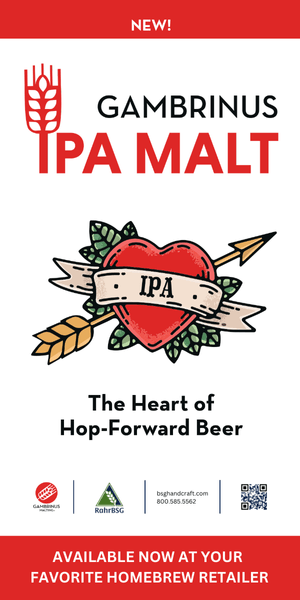Not-Quite-Amber Waves of Grain
Not-Quite-Amber Waves of Grain
(5 gallons/19 L, all-grain)
OG = 1.044 FG = 1.012 IBU = 25 SRM = 4 ABV = 4.2%
Ingredients
4 lbs. (1.8 kg) Maris Otter pale malt
4 lbs. (1.8 kg) wheat malt
1 lb. (0.45 kg) Victory® malt
4.5 AAU Liberty hops (60 min.) (1 oz./28 g at 4.5% alpha acids)
9.2 AAU Amarillo® hops (5 min.) (1 oz./28 g at 9.2% alpha acids)
Wyeast 1007 (German Ale) or White Labs WLP029 (German Ale/Kölsch) yeast
3⁄4 cup corn sugar (if priming)
Step by Step
Mill the grains and mix with 3.2 gallons (12 L) of 164 °F (73 °C) strike water to reach a mash temperature of 152 °F (67 °C). Hold this temperature for 60 minutes. Vorlauf until your runnings are clear and lauter. Sparge the grains with 4.6 gallons (17.4 L) water and top up as necessary to obtain 6 gallons (23 L) of wort.
Boil for 60 minutes, adding hops according to the schedule. After the boil, turn off heat and chill the wort to slightly below fermentation temperature, about 65 °F (18 °C). Aerate the wort with pure oxygen or filtered air and pitch the yeast. Ferment at 68 °F (20 °C) for seven days. Raise to 70 °F (21 °C) for seven more days. Once the beer reaches terminal gravity, bottle or keg the beer and carbonate to approximately 2.5 volumes. You may want to cold-crash the beer prior to packaging at 35 °F (2 °C) for 48 hours to improve clarity.
Not-Quite-Amber Waves of Grain
(5 gallons/19 L, partial mash)
OG = 1.044 FG = 1.012 IBU = 25 SRM = 4 ABV = 4.2%
Ingredients
1.2 lbs. (0.54 kg) extra light dried malt extract
3.3 lbs. (1.5 kg) wheat liquid malt extract
1 lb. (0.45 kg) Maris Otter pale malt
1 lb. (0.45 kg) Victory® malt
4.5 AAU Liberty hops (60 min.) (1 oz./28 g at 4.5% alpha acids)
9.2 AAU Amarillo® hops (5 min.) (1 oz./28 g at 9.2% alpha acids)
Wyeast 1007 (German Ale) or White Labs WLP029 (German Ale/Kölsch) yeast
3⁄4 cup corn sugar (if priming)
Step by Step
Bring 1 gallon (3.8 L) of water to approximately 152 °F (67 °C) and hold there, and steep milled grains in grain bags for 45 minutes. Remove the grain bags, and wash with 1 gallon (3.8 L) hot water. Top off to 5.6 gallons (21.2 L) of wort. Add liquid and dried malt extract while stirring, and stir until completely dissolved.
Boil for 60 minutes, adding hops according to the ingredient list. After the boil, turn off heat and chill the wort to slightly below fermentation temperature, about 65 °F (18 °C). Aerate the wort with pure oxygen or filtered air and pitch the yeast. Ferment at 68 °F (20 °C) for seven days. Raise to 70 °F (21 °C) for seven more days. Once the beer reaches terminal gravity, bottle or keg the beer and carbonate to approximately 2.5 volumes. You may want to cold-crash the beer prior to packaging at 35 °F (2 °C) for 48 hours to improve clarity.
Tips for Success: To be frank, this is an easy beer to get right! The only real issue may be for all-grain brewers with fussy mashing equipment: I’ve never had a stuck sparge situation here, but if you do, a pound of rice hulls should do the trick. You can sub in your favorite aroma hops for the five-minute addition (or whirlpool addition, if that’s your thing), but I’d recommend that you not overdo it. The hops should add to the aroma, not overwhelm it. A pleasant grainy nose is a key part of the enjoyment level for this beer. I like the Wyeast 1007 (German Ale) yeast here because it adds a nice berry ester as a backing note in the flavor, but feel free to experiment with a favorite yeast for your own.






